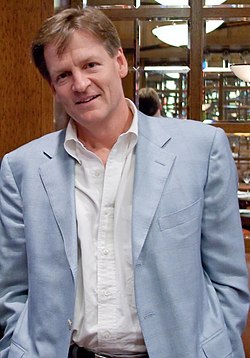Michael Lewis | |
|---|---|
 Lewis in 2009 | |
| Born | Michael Monroe Lewis October 15, 1960 New Orleans, Louisiana, U.S. |
| Occupation | Nonfiction writer, journalist |
| Alma mater | Princeton University (BA) London School of Economics (MSc) |
| Period | 1989–present |
| Notable works |
|
| Spouse | |
| Website | |
| michaellewiswrites | |
Michael Monroe Lewis (born October 15, 1960) [1] [2] is an American author and financial journalist. [3] He has also been a contributing editor to Vanity Fair since 2009, writing mostly on business, finance, and economics. He is known for his nonfiction work, particularly his coverage of financial crises and behavioral finance.
Contents
- Early life
- Career
- Writing
- Broadcasting and podcasts
- Reception
- Personal life
- Awards and recognition
- Bibliography
- See also
- References
- External links
Lewis was born in New Orleans and attended Princeton University, from which he graduated with a degree in art history. After attending the London School of Economics, he began a career on Wall Street during the 1980s as a bond salesman at Salomon Brothers. The experience prompted him to write his first book, Liar's Poker (1989). Fourteen years later, Lewis wrote Moneyball: The Art of Winning an Unfair Game (2003), in which he investigated the success of the Oakland Athletics of Major League Baseball and their general manager Billy Beane. His 2006 book The Blind Side: Evolution of a Game was his first to be adapted into a film, The Blind Side (2009). In 2010, he released The Big Short: Inside the Doomsday Machine . The film adaptation of Moneyball was released in 2011, followed by The Big Short in 2015.
Lewis's books have won two Los Angeles Times Book Prizes and several have reached number one on The New York Times Best Seller list , including his most recent book, Going Infinite (2023). [4]